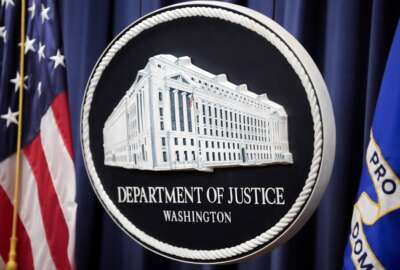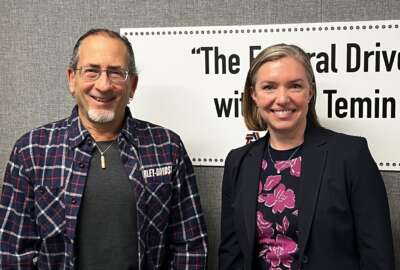Coast Guard commandant on Gulf Coast response
President Barack Obama\'s pick to lead the Coast Guard proposed major cuts to the agency\'s counterterrorism mission. You can imagine how that\'s being received.
By Dorothy Ramienski
Internet Editor
Federal News Radio
The commandant of the Coast Guard is responsible for all world-wide Coast Guard activities. He oversees 42,000 active duty military, and 8,000 civilian full-time employees.
Also under his command are another 8,000 reserve military part-time employees, and 30,000 civilian auxiliary volunteers.
Admiral Robert Papp assumed these duties on May 25, and has pledged to refine the homeland mission of USCG.
Papp talked with Federal News Radio about a variety of topics on Wednesday morning, including USCG’s response to the Deepwater Horizon oil spill.
Fighting Disaster in the Gulf
The Coast Guard has always been responsible for sovereignty and security issues along the coast of the U.S., and Papp said this has gained new meaning in the aftermath of 9/11. (In 2003, USCG was moved under the Department of Homeland Security.)
USCG has been instrumental, too, when it comes to assisting with natural disasters, and their efforts in the Gulf of Mexico are no exception.
Papp explained that it has been a team effort so far, and said the retention of Admiral Thad Allen as National Incident Commander has been essential to their work.
“He [is] very well qualified for the job, having dealt with Hurricane Katrina [in 2005] along the Gulf Coast. The lines of authority go from the President to the Secretary of Homeland Security to the National Incident Commander in this particular case, and, as Commandant of the Coast Guard, I’m providing forces to Admiral Allen and that National Incident Command, which is a cross-government response in this particular case, to help with the spill. We’ve got about 2,000 people. We have about 20 of our Coast Guard cutters. We have nearly two dozen aircraft down there doing surveillance, spotting oil and people working in incident command posts. Then [we have] people actually out supervising and directing the commercial clean up activities that are going on.”
Papp said he speaks to Allen almost daily, whether it is via email or in person.
Deepwater Acquisition Program Update
The acquisition project known as Deepwater is not without controversy.
During the 1990s, USCG saw some of its funding cut at the end of the Cold War. After 9/11, when the Coast Guard was moved under DHS, some of that funding was restored, and USCG began modernization efforts. During the last decade, not all of those new funds were managed properly and Deepwater came under fire.
A recent report from the Government Accountability Office, however, shows that the Coast Guard has taken steps to rework how they manage acquisitions, management and oversight.
Papp explained that Deepwater was very innovative when it was conceived, but does admit that the road to success has not always been smooth.
“We called it a system of systems approach. It was at a time when the Coast Guard was just recovering from some significant reductions in the mid-90s. We had to rely upon industry to provide us guidance and some help with the acquisition projects. We had some fits and starts and some problems to begin with, but what we’ve done is built our own acquisition force within the Coast Guard. We’ve disagregated the various projects that were in that [and] given them project baselines of their own and we’ve got a much, much better granularity on that right now. We’re producing some great ships. We just laid the keel on a new line of patrol boats down . . . a couple months ago. We’re getting good aircraft, which we’re using down in the Gulf as we speak. So, while the project had a couple of fits and starts, it’s going well now and we just have to make sure the Administration and Congress give us continued funding to keep those projects going.”
Challenges Ahead
That funding, Papp said, is essential to keeping the Coast Guard up to snuff. He explained that one of the biggest challenges he is currently facing has to do with the fact that many of the ships are starting to show their age.
“The major cutters that we use . . . to protect our fisheries, for search and rescue, patrols to intercept drugs or to save migrants trying to reach our shores are all about 40 years old. Now, some people might think that’s not a lot, but the fact of the matter is, the Navy oftentimes only uses their ships for 20 years before they find them to be obsolete. We’ve got ships that were built in the 60s and some of our aircraft even go back that far. Quite frankly, they’re getting very expensive to maintain and they’re falling apart. Part of my effort will be to try and get that infrastructure replaced as we go forward in the next few budget cycles.”
Recruitment and retention is another issue that the Commandant will face. He explained that the numbers have never been higher for either, which works out to be what he called a “bittersweet problem”.
“We’re keeping an awful lot of people because they want to serve in the Coast Guard. I suspect the economy has a little bit to do with it, as well, but we’ve got a lot of great, patriotic people that have stepped forward to serve their country. Right now, because we are not growing, it’s slowing down opportunities for promotion and, in fact, with a slight reduction in our force that we’re seeing in the FY 2011 budget, we’re going to to have to send some of those people home.”
Coast Guard 2.0
Social media (or the term, at any rate) is exploding throughout the federal government, and the USCG will not be left behind, according to Papp. He said he personally finds the concepts and technologies very useful, and will be pushing for more adoption in the future.
“We have a Coast Guard homepage [and] have sort of consolidated things. There were a number of locations you could go to for individual Coast Guard leaders. We’ve brought them all onto one senior leadership page, which then links over to what we call our Compass blog where we put stories on a day to day basis, respond to comments that come in on those stories, and I’ve also put my toe in the water in terms of actually getting on and providing comments to other blogs. When I think it’s appropriate [or] when I see some misinformation, I’ve actually gone onto a couple of privately owned blogs and put my own comments on there under my title. I’ve gotten some very positive response from it.”
Copyright © 2025 Federal News Network. All rights reserved. This website is not intended for users located within the European Economic Area.





